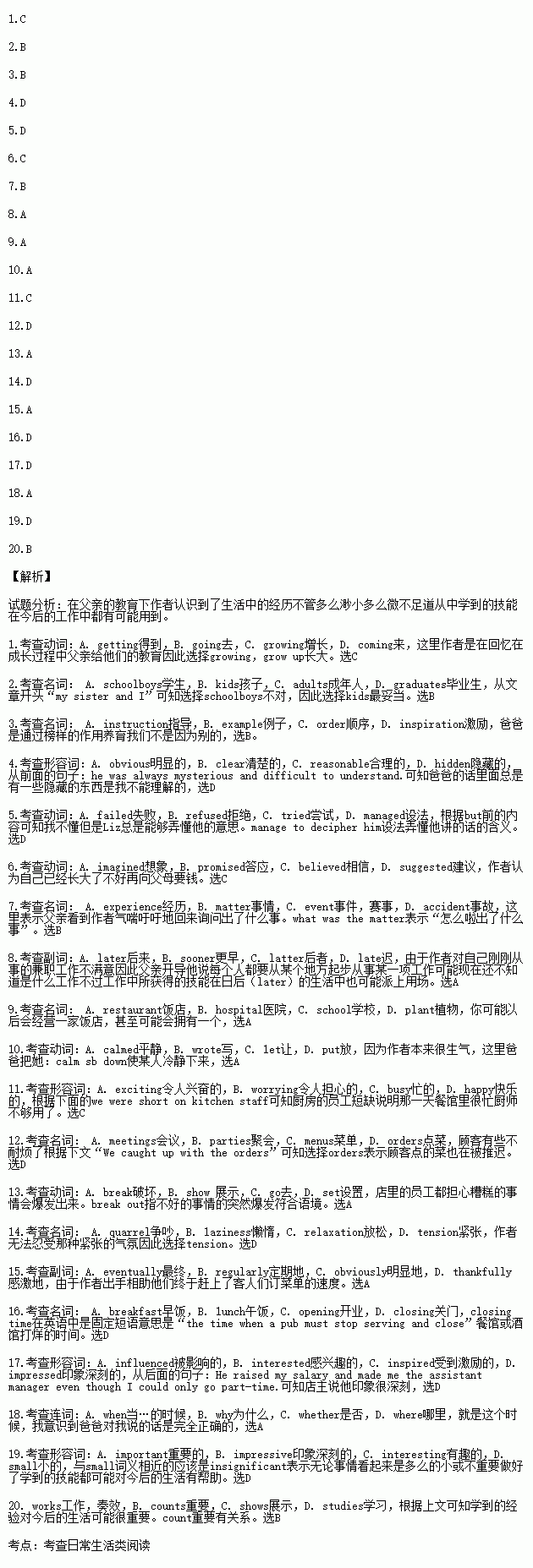题目内容
A few days ago, my sister Liz and I talked about Dad, and we decided to get him a little something for Father's Day. We talked about the times when we were up and how Mom and Dad used to play the ‘good cop, bad cop’ thing on us. Dad has been a person of few words since we were . He raised us more by than anything else. When he spoke, though we listened, he was always mysterious and difficult to understand. There was always a(n) meaning that I never got, but Liz always to decipher(破解) him. By the time I got to high school, I had wanted a skateboard and I I was too old to ask money from my parents, so I worked at a burger joint (美式汉堡店). One day, I was really angry about annoying burgers. I came home huffing and puffing(气喘吁吁). Dad saw me and asked me what was the . I told him that I was fed up with annoying burgers. He said that we all have to start somewhere, that we may not know it now, but the skills we learn even in a burger joint might come in handy __ __in life, ‘Who knows, you might end up having to run a or even own one when you grow up,’ said Dad. He me down and I kept what he said in mind, even though I really didn’t agree with it.
A couple of years later, when I got to college, I worked in a restaurant. During one of the really days that we had, we were short on kitchen staff. Our customers were getting impatient and the were getting delayed. We were sure any minute something terrible would out. I couldn’t stand the any more, so I rolled up my sleeves, got myself a hair net and helped out in the hot kitchen. We caught up with the orders . The owner saw what I did and called me over around time. He said that he was very . He raised my salary and made me the assistant manager even though I could only go part-time. That was I realized that what my dad said to me all those years before was absolutely true.
I’ve never forgotten what my dad said that day. And whenever I have to do something that requires new skills, no matter how insignificant or it seems, I have a new perspective(看法) that it might really help me later on or even right now and I just don’t know it. Experience is everything and it a lot when you take lessons from it. That’s my life’s philosophy.
1.A. getting B. going C. growing D. coming
2.A. schoolboys B. kids C. adults D. graduates
3.A. instruction B. example C. order D. inspiration
4.A. obvious B. clear C. reasonable D. hidden
5.A. failed B. refused C. tried D. managed
6.A. imagined B. promised C. believed D. suggested
7.A. experience B. matter C. event D. accident
8.A. later B. sooner C. latter D. late
9.A. restaurant B. hospital C. school D. plant
10.A. calmed B. wrote C. 1et D. put
11.A. exciting B. worrying C. busy D. happy
12.A. meetings B. parties C. menus D. orders
13.A. break B. show C. go D. set
14.A. quarrel B. 1aziness C. relaxation D. tension
15.A. eventually B. regularly C. obviously D. thankfully
16.A. breakfast B. 1unch C. opening D. closing
17.A. influenced B. interested C. inspired D. impressed
18.A. when B. why C. whether D. where
19.A. important B. impressive C. interesting D. small
20.A. works B. counts C. shows D. studies
 举一反三期末百分冲刺卷系列答案
举一反三期末百分冲刺卷系列答案
